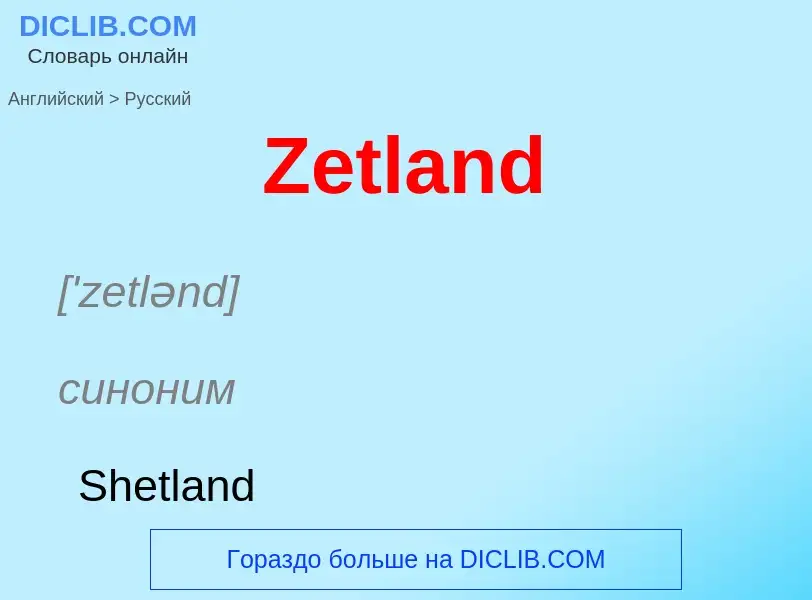Μετάφραση και ανάλυση λέξεων από την τεχνητή νοημοσύνη ChatGPT
Σε αυτήν τη σελίδα μπορείτε να λάβετε μια λεπτομερή ανάλυση μιας λέξης ή μιας φράσης, η οποία δημιουργήθηκε χρησιμοποιώντας το ChatGPT, την καλύτερη τεχνολογία τεχνητής νοημοσύνης μέχρι σήμερα:
- πώς χρησιμοποιείται η λέξη
- συχνότητα χρήσης
- χρησιμοποιείται πιο συχνά στον προφορικό ή γραπτό λόγο
- επιλογές μετάφρασης λέξεων
- παραδείγματα χρήσης (πολλές φράσεις με μετάφραση)
- ετυμολογία
Zetland - translation to ρωσικά
['zetlənd]
синоним
существительное
общая лексика
Шетланд
['ʃetlənd]
общая лексика
шетлендский /шетландский/ пони (одна из самых древних пород)
шетландский
шетлендский
полное выражение
Shetland pony; выведен на Шетландских о-вах
существительное
география
Шетланд (графство Шотландии)
синоним
Ορισμός
Βικιπαίδεια
Shetland, also called the Shetland Islands and formerly Zetland, is a subarctic archipelago in Scotland lying between Orkney, the Faroe Islands, and Norway. It is the northernmost region of the United Kingdom.
The islands lie about 80 km (50 mi) to the northeast of Orkney, 170 km (110 mi) from mainland Scotland and 220 km (140 mi) west of Norway. They form part of the border between the Atlantic Ocean to the west and the North Sea to the east. Their total area is 1,466 km2 (566 sq mi), and the population totalled 22,920 in 2019. The islands comprise the Shetland constituency of the Scottish Parliament. The local authority, the Shetland Islands Council, is one of the 32 council areas of Scotland. The islands' administrative centre and only burgh is Lerwick, which has been the capital of Shetland since 1708, before which time the capital was Scalloway.
The archipelago has an oceanic climate, complex geology, rugged coastline, and many low, rolling hills. The largest island, known as "the Mainland", has an area of 967 km2 (373 sq mi), and is the fifth-largest island in the British Isles. It is one of 16 inhabited islands in Shetland.
Humans have lived in Shetland since the Mesolithic period. Picts are known to have been the original inhabitants of the islands, before the Norse conquest and subsequent colonisation in the Early Middle Ages. During the 10th to 15th centuries, the islands formed part of the Kingdom of Norway until they were annexed into the Kingdom of Scotland due to a royal dispute involving the payment of a dowry. In 1707, when Scotland and England united to form the Kingdom of Great Britain, trade between Shetland and continental Northern Europe decreased. The discovery of North Sea oil in the 1970s significantly boosted Shetland's economy, employment and public-sector revenues. Fishing has always been an important part of the islands’ economy.
The local way of life reflects the Norse heritage of the isles, including the Up Helly Aa fire festivals and a strong musical tradition, especially the traditional fiddle style. Almost all place names in the islands also have Norse origin. The islands have produced a variety of prose writers and poets, who have often written in the distinctive Shetland dialect. Numerous areas on the islands have been set aside to protect the local fauna and flora, including a number of important seabird nesting sites. The Shetland pony and Shetland Sheepdog are two well-known Shetland animal breeds. Other animals with local breeds include the Shetland sheep, cow, goose, and duck. The Shetland pig, or grice, has been extinct since about 1930.
The islands' motto, which appears on the Council's coat of arms, is "Með lögum skal land byggja" (“By law shall the land be built"). The phrase is of Old Norse origin, is mentioned in Njáls saga, and was likely borrowed from provincial Norwegian laws such as the Frostathing Law.

![[[Unst]] [[Unst]]](https://commons.wikimedia.org/wiki/Special:FilePath/Baliasta and Baltasound from Houlland - geograph.org.uk - 921747.jpg?width=200)
![[[Apache Corporation]]'s Beryl alpha oil platform in the [[East Shetland Basin]] [[Apache Corporation]]'s Beryl alpha oil platform in the [[East Shetland Basin]]](https://commons.wikimedia.org/wiki/Special:FilePath/Beryl alpha from air.jpg?width=200)
.jpg?width=200)
![County Buildings]] in Lerwick, the former headquarters of Zetland County Council County Buildings]] in Lerwick, the former headquarters of Zetland County Council](https://commons.wikimedia.org/wiki/Special:FilePath/County Buildings, King Erik Street, Lerwick (geograph 5160230).jpg?width=200)

![[[Mainland, Shetland]] [[Mainland, Shetland]]](https://commons.wikimedia.org/wiki/Special:FilePath/Gulberwick IMG 3157 (20121529905).jpg?width=200)
![[[Haroldswick]] Methodist Church, the most northerly church building in the United Kingdom [[Haroldswick]] Methodist Church, the most northerly church building in the United Kingdom](https://commons.wikimedia.org/wiki/Special:FilePath/Haroldswick Methodist Church.jpg?width=200)
![Margaret of Denmark]], whose betrothal led to Shetland passing from Norway to Scotland. Margaret of Denmark]], whose betrothal led to Shetland passing from Norway to Scotland.](https://commons.wikimedia.org/wiki/Special:FilePath/James III and Margaret of Denmark.jpg?width=200)

![allied]] naval officer of the war.<ref name=scotsatwar/> allied]] naval officer of the war.<ref name=scotsatwar/>](https://commons.wikimedia.org/wiki/Special:FilePath/Leif Larsen.jpg?width=200)
![[[Lerwick]] is Shetland's largest settlement [[Lerwick]] is Shetland's largest settlement](https://commons.wikimedia.org/wiki/Special:FilePath/Lerwick from Staney Hill. - Remy Osman.jpg?width=200)
![[[Loganair]] aircraft in [[Fair Isle]], midway between [[Orkney]] and Shetland [[Loganair]] aircraft in [[Fair Isle]], midway between [[Orkney]] and Shetland](https://commons.wikimedia.org/wiki/Special:FilePath/Loganair Islander at Fair Isle.jpg?width=200)
![[[Atlantic Mackerel]] [[Atlantic Mackerel]]](https://commons.wikimedia.org/wiki/Special:FilePath/Maquereaux etal.jpg?width=200)
.jpg?width=200)

![Shetland (boxed) in relation to surrounding territories including [[Norway]] (to the east), the [[Faroe Islands]] (to the north west), and [[Orkney]] and the rest of the [[British Isles]] (to the south west). Shetland (boxed) in relation to surrounding territories including [[Norway]] (to the east), the [[Faroe Islands]] (to the north west), and [[Orkney]] and the rest of the [[British Isles]] (to the south west).](https://commons.wikimedia.org/wiki/Special:FilePath/Shetland (boxed) with surrounding lands.png?width=200)
![Crofthouse]] museum Crofthouse]] museum](https://commons.wikimedia.org/wiki/Special:FilePath/Shetland crofthouse museum.jpg?width=200)

![The [[Lerwick]] [[Up Helly Aa]] The [[Lerwick]] [[Up Helly Aa]]](https://commons.wikimedia.org/wiki/Special:FilePath/UpHellyAa3(AnneBurgess)30Jan1973.jpg?width=200)

![Full-rigged ship ''Maella'', of [[Oslo]], in Bressay Sound, around 1922 Full-rigged ship ''Maella'', of [[Oslo]], in Bressay Sound, around 1922](https://commons.wikimedia.org/wiki/Special:FilePath/Wind Bound Lerwick around 1880.jpg?width=200)
